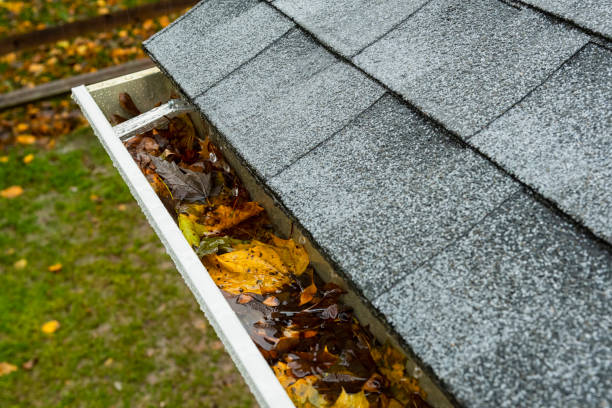
When it comes to home maintenance, gutters are often overlooked. However, they play a critical role in protecting your home from water damage. If you’ve ever wondered what gutters are and why they are so important, this blog will give you all the answers you need.
Gutters are narrow channels, typically made of metal, vinyl, or plastic, that are attached along the edges of your roof. Their primary function is to catch rainwater and direct it away from your home through downspouts. This helps to prevent water from accumulating around your foundation, walls, and landscaping.
Gutters come in various styles and materials, including seamless aluminum, copper, and steel. Some homeowners prefer seamless gutters as they minimize the risk of leaks, while others choose decorative options like copper for an aesthetic touch. Copper gutters are particularly noted for their stylish and elegant appearance, complementing various architectural styles despite their higher cost compared to more common materials like vinyl or aluminum. Regardless of the type, all gutters serve the essential purpose of managing rainwater runoff.
A gutter system consists of several components that work together to collect and redirect rainwater away from a home’s foundation. Understanding these components can help you appreciate the complexity and importance of a well-maintained gutter system.
Without gutters, rainwater would pour directly off your roof, causing a variety of issues that can lead to expensive repairs. Professional gutter installation is crucial for ensuring that your home is protected from water damage and structural issues. Here are some key reasons why gutters are essential:
Gutters serve as a drainage system that directs rainwater away from your home’s foundation, walls, and landscaping. This not only helps in maintaining the structural integrity of your home but also plays a crucial role in preventing erosion. Properly installing gutters can prevent costly repairs and maintain the integrity of your home.
Gutters protect your home’s foundation by directing rainwater away. Without them, water can pool around the base of your house, leading to soil erosion, cracks, and even foundation shifting over time. Over time, unchecked water accumulation can cause extensive structural issues, making costly repairs inevitable.
Excess water near your foundation can seep into your basement, leading to flooding, mold growth, and structural issues. Gutters help minimize this risk by channeling rainwater safely away. Damp basements not only create an unpleasant environment but also contribute to health hazards due to mold and mildew formation.
A properly functioning gutter system helps reduce the risk of roof leaks. Without gutters, water can accumulate along the roofline, increasing the chances of water damage and deterioration of shingles. This can result in costly roof replacements far earlier than expected. Ice dams in colder climates can also be prevented with well-maintained gutters.
If rainwater is not controlled, it can wash away soil, damage flower beds, and create unsightly puddles. Gutters help maintain the integrity of your landscaping by directing water to designated drainage areas. Without them, your garden, pathways, and lawn could suffer significant damage, leading to additional costs for repairs and replanting.
Excess moisture can cause siding, doors, and windows to deteriorate over time. Water running down exterior walls can lead to staining, rot, and mold growth, which can be costly to fix. Over time, unchecked moisture exposure can lead to warping, peeling paint, and unsightly watermarks on your home’s facade.
Standing water around your home can attract mosquitoes, termites, and other pests. Gutters help eliminate stagnant water, making your home less appealing to unwanted critters. Termites thrive in damp conditions, and clogged or ineffective gutters can create the perfect breeding ground for them, potentially leading to serious structural damage.
To ensure your gutters function properly, regular maintenance is essential. This includes:
Neglecting gutter maintenance can lead to costly repairs and replacements, making routine checks a smart investment in your home’s longevity.
Gutters can be prone to several common problems, which can affect their performance and longevity. Being aware of these issues can help you take proactive steps to maintain your gutter system.
There are several factors to consider when selecting the right gutters for your home. Choosing the right rain gutter is crucial for effective water management, protecting your home from potential water damage.
Gutter guards and accessories can help to improve the performance and longevity of a gutter system, making maintenance easier and more efficient.
Gutter guards are devices installed over the top of gutters to prevent debris from entering the system. They work by allowing rainwater to flow into the gutters while keeping leaves and other materials out. Gutter guards can be made from a variety of materials, including metal, plastic, and mesh, and can be installed on existing gutters or as part of a new gutter system.
Some common types of gutter guards include:
While gutters may seem like a small component of your home, their role in protecting your property is invaluable. By keeping water away from your foundation, roof, and exterior walls, gutters help prevent costly repairs and maintain your home’s longevity. Regular maintenance and timely repairs will ensure they continue to function effectively for years to come.
Investing in quality gutters and keeping them in good condition is a small effort that goes a long way in preserving the value and safety of your home. By choosing the right gutters and maintaining them properly, you can safeguard your home against potential water damage and enjoy peace of mind, no matter the weather.